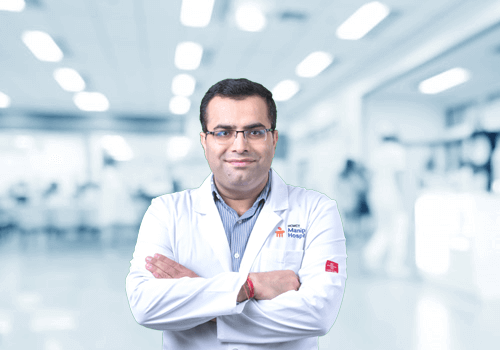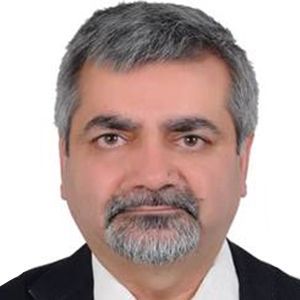About the Doctor
Dr. Noaline Sinha has extensive experience in all aspects of Nuclear Medicine, both diagnostic and therapeutic. She brings with her several years experience of reporting whole body PET-CT studies, Cardiac PET studies, Myocardial perfusion studies as well as innumerable other nuclear medicine procedures, including intra-operative use of hand held gamma probe. She has special interest in radio nuclear therapy especially in the treatment of patients of carcinoma thyroid with high dose I-131 therapy neuroendocrine and prostate cancer. In her previous employment, she played a major role in guiding the Department of Nuclear Medicine and PET CT through the NABH programme (National Accreditation Board for Hospitals and Healthcare Providers) through successive years, creating all workflow processes and documentation related to the same.
Specialization
Frequently Asked Questions About Nuclear Medicine
What is Nuclear Medicine?
Nuclear Medicine is a medical specialty that is used to diagnose and treat diseases in a safe and painless way. Nuclear medicine procedures permit the determination of medical information that may otherwise be unavailable, require surgery, or necessitate more expensive and invasive diagnostic tests. Nuclear medicine imaging is unique, because it provides doctors with information about both structure and function.The procedures often identify abnormalities very early in the progression of a disease – long before some medical problems are apparent with other diagnostic tests. The early detection allows a disease to be treated sooner in its course when a more successful prognosis may be possible.
How do Radiopharmaceuticals work?
Radiopharmaceuticals are introduced into the patient’s body by injection, swallowing, or inhalation. The amount given is very small. The pharmaceutical is designed to go to a specific place in the body where there could be disease or an abnormality. The radioactive part of the radiopharmaceutical that emits radiation, known as gamma rays (similar to x-rays), is then detected using a special camera called a gamma camera. This type of camera allows the nuclear medicine physician to see what is happening inside your body.
During this imaging procedure, the patient is asked to lie down on a bed and then the gamma camera is placed a few inches over the patient’s body. Pictures are taken over the next few minutes. These images allow expert nuclear medicine physicians to diagnose the patient’s disease.
Are radiopharmaceuticals safe?
Nuclear medicine procedures are among the safest diagnostic imaging exams available. The amount of radiation in a typical nuclear imaging procedure is comparable with that received during a diagnostic Xray, and the amount received in a typical treatment procedure is kept within safe limits.Absolutely, like any medicine they are prepared with great care. The risk of a reaction is 2-3 incidents per 100,000 injections of x-ray contrast media.
What kind of diseases can Nuclear Medicine cure?
Nuclear medicine can diagnose many different kinds of diseases. It can be used to identify abnormal lesions deep in the body without exploratory surgery. The procedures can also determine whether or not certain are organs are functioning normally. For instance, nuclear medicine can determine whether or not the heart can pump blood adequately, if the brain is receiving an adequate blood supply, and if the brain cells are functioning properly or not. Nuclear medicine can determine whether or not the kidneys are functioning normally, and whether the stomach is emptying properly.
It can determine patient’s blood volume, lung function, vitamin absorption, and bone density. Nuclear medicine can locate the smallest bone fracture before it can be seen on an x-ray. It can also identify sites of seizures (epilepsy), Parkinson’s disease, and Alzheimer’s disease. Nuclear medicine can find cancers, determine whether they are responding to treatment, and determine if infected bones will heal.
After a heart attack, nuclear medicine procedures can assess the damage to the heart. It can also tell physicians how well newly transplanted organs are functioning.
Is radioactivity harmful?
Although exposure to the radioactivity in very large doses can be harmful, the radioactivity in radiopharmaceuticals is carefully selected by the nuclear medicine physician to be safe. The doses of radiotracer administered are small and diagnostic nuclear medicine procedures result in minimal radiation exposure. Thus, the radiation risk is very low compared with the potential benefits.
How is nuclear medicine different from X-RAY, CT SCAN, Ultrasound, or MRI?
Nuclear medicine can detect the radiation coming from inside a patient’s body. All of the above-mentioned procedures (except nuclear scans), expose the patient to radiation form outside the body using machines that send radiation through the body. As a result, nuclear medicine determines the cause of a medical problem based on organ function in contrast to the other diagnostic tests, which determine the presence of disease based on anatomy or structural appearance. One nuclear medicine procedure, called a PET (positron emission tomography) scan, precisely localizes many types of diseases in the body just by determining how the disease uses sugar. No other imaging method has the ability to use our body’s own functions to determine disease status.
Do I need to do anything special after I have a nuclear medicine procedure?
After most nuclear medicine procedures, it is generally best to drink a lot of fluids and urinate as frequently as you can. This helps to flush the remaining radioactivity out of your body. The length of time you need to do this will depend on the radiopharmaceutical that was used. Again, it is best to ask your doctor.
Why is a Bone Scan done?
A bone scan is done to determine whether a cancer from another area has spread to the bone, the cause or location of unexplained bone pain, to help diagnose broken bones such as a hip fracture or a stress fracture, not clearly seen on X-ray and to detect damage to the bones caused by infection or other conditions.











